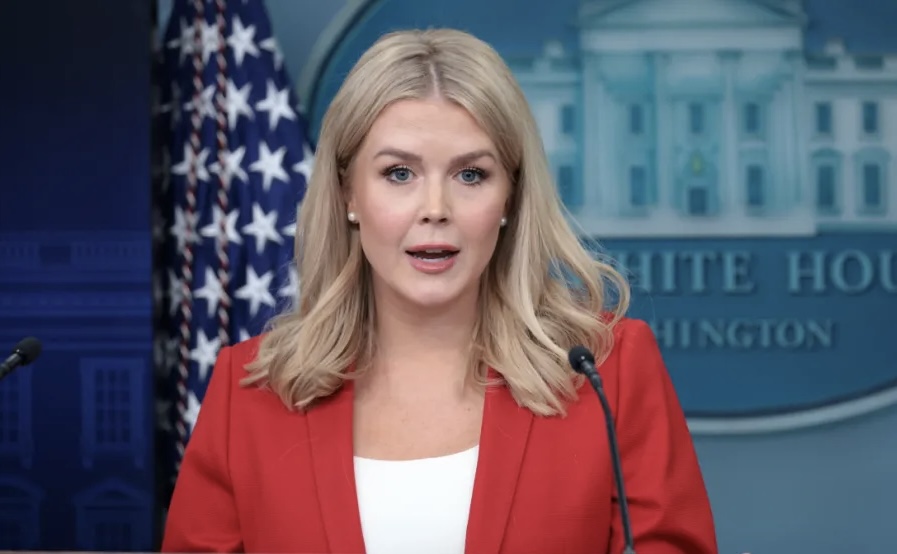Media Stunned as Karoline Leavitt Exposes Doge’s Hidden Corruption
In a stunning revelation that has rocked political and media circles, investigative journalist Karoline Leavitt has unveiled significant corruption within Doge, a government initiative previously shrouded in secrecy. Her findings, presented during a live White House press briefing, have forced an urgent reassessment of the narrative that major news outlets and political figures have long promoted.
Leavitt, a well-respected reporter known for her relentless pursuit of truth, shared a detailed exposé of abuses within the Doge program. Her presentation included a wealth of documentation—internal memos, emails, and financial records—that provided irrefutable evidence of corruption and mismanagement. Leavitt revealed that instead of advancing government efficiency as promised, Doge had engaged in actions benefiting political allies and undermining the interests of American taxpayers.
Her findings highlighted key issues such as the misappropriation of funds, where substantial sums earmarked for efficiency initiatives were instead directed toward projects benefiting specific political factions. Additionally, Leavitt’s investigation uncovered opaque decision-making processes, with major decisions bypassing established protocols for oversight. Most alarming was evidence suggesting that political bias had influenced Doge’s actions, with decisions made to favor certain political groups rather than serving the public interest.
The significance of Leavitt’s exposé wasn’t just in the substance of her findings but in how they were delivered. The White House press room, typically buzzing with activity, fell silent as Leavitt laid out her case. Reporters, many of whom had previously been accused of failing to fully address issues of government corruption, were left stunned. For a moment, the usual frantic attempts to downplay or discredit the story were absent, leaving only the undeniable facts presented by Leavitt. This forced a reevaluation of the narrative surrounding Doge, leaving even seasoned political analysts in shock.
In the aftermath of the briefing, White House officials attempted to downplay the allegations, asserting that Doge’s activities were within legal bounds and promising that any discrepancies would be addressed through proper channels. However, these statements did little to quell the growing public outcry. Leavitt’s findings sparked a wave of criticism, and the administration’s lack of a robust response only deepened concerns about its transparency and accountability.
Leavitt’s investigation has far-reaching implications. It calls into question the true purpose of temporary government agencies like Doge. Originally portrayed as a tool to streamline government operations, Doge now appears to have been misused to further political agendas. This scandal highlights the dangers of unchecked power within temporary agencies and raises important questions about government oversight and the potential for future abuses.
The fallout has already begun, with prominent political figures such as Senate Minority Leader Chuck Schumer signaling plans to challenge the administration through legal and legislative avenues. Increased calls for transparency and stronger oversight measures are expected, with lawmakers looking to introduce new bills aimed at preventing future misconduct. Additionally, there is talk of establishing more robust whistleblower protections and oversight committees to ensure agencies like Doge cannot be misused again.
One of the most significant consequences of Leavitt’s report has been the surge in grassroots activism. Citizens across the political spectrum are demanding answers, with protests and town halls springing up across the country. This mobilization reflects a broader shift in public sentiment, with a growing sense that government corruption and executive overreach must be addressed. Leavitt’s work has tapped into widespread concerns about the integrity of government institutions and has fueled a movement calling for greater accountability.
This moment also underscores the crucial role of investigative journalism in a democracy. Leavitt’s relentless pursuit of the truth and her ability to present clear, compelling evidence has forced a powerful reckoning, shaking long-standing narratives and compelling the media, the White House, and the public to confront uncomfortable truths. Her efforts have reminded us of the importance of a free press in holding power to account and ensuring transparency.
The implications of this scandal stretch far beyond Doge itself. It touches on broader debates about government efficiency, accountability, and the proper scope of executive power. Leavitt’s exposé has prompted a vital conversation about how to safeguard against abuses within government agencies and how to ensure that power is used responsibly. As legal challenges and public pressure mount, the outcome of this battle for transparency will shape the future of American governance.
Ultimately, Leavitt’s reporting stands as a beacon for those committed to truth and accountability. Her unwavering dedication to uncovering the facts has ignited a national conversation, one that demands a government that serves its citizens honestly and effectively.
